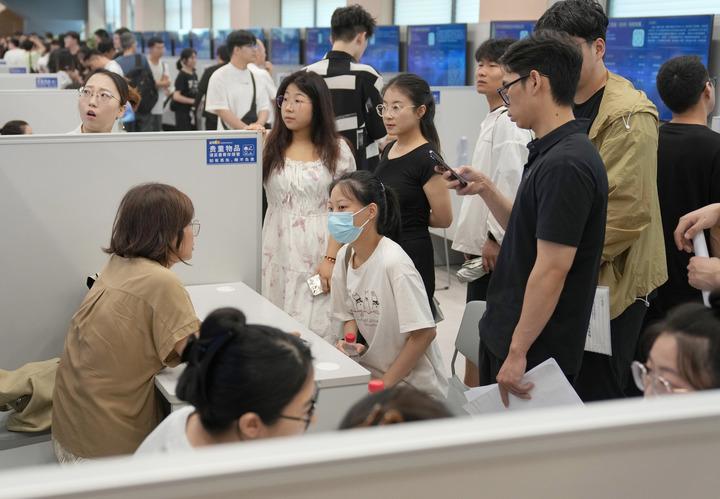BEIJING, Aug. 6 (Xinhua) -- China's job market has remained stable amid rising global challenges, supported by a range of policy measures from central and local authorities to boost employment and help companies retain jobs.
According to the latest data, the average urban surveyed unemployment rate nationwide in the first half of the year was 5.2 percent, down 0.1 percentage points from the first quarter, indicating an overall stable employment situation.
Amid an increasingly complex and challenging external environment, Zhang Chenggang, director of the research center for new forms of employment, emphasized the need for concerted efforts to tackle these challenges.
"We must fully counter the impact of external pressures and domestic economic shifts on employment," Zhang said, calling for diverse measures to ensure both high-quality and sufficient employment.
The State Council recently issued a notice on further strengthening policy support to maintain employment stability, and unveiled seven policy measures. Among them are a package of new initiatives, including expanding the scope of special loans for keeping the job market stable, increasing the proportion of unemployment insurance rebates for related enterprises, and broadening the coverage of social insurance subsidies.
These measures reaffirm the government's support. Starting this year, China will subsidize vocational skills training for over 10 million people annually for three consecutive years, with a focus on key sectors like healthcare, childcare, advanced manufacturing, modern services and new occupations, according to the State Council.
In the first half of the year, China's GDP grew by 5.3 percent year on year. While the overall economy provides a foundation for employment, many regions have ramped up employment-first policies, refined job promotion mechanisms, and injected fresh momentum into enterprises to keep the job market stable.
For instance, Jiangxi Province has intensified efforts to explore and expand job opportunities in key fields, key industries, grassroots areas, and small and micro-sized enterprises, while supporting employment among key groups. Chongqing has implemented a youth employment and entrepreneurship action plan targeting around 1 million college graduates and others. Jilin Province's human resources and social security departments have established direct contacts with 69 local colleges and universities to promote policies and offer job guidance.
These pragmatic measures have significantly facilitated graduate employment, steadily injecting fresh energy into economic and social development.
On the demand side, recruitment has surged in emerging industries and modern services, fueled by deeper integration of technological and industrial innovation, coupled with steady consumption growth.
Recruiting platform Zhaopin.com reported strong year-on-year growth in Q2. Hiring demand in industries such as humanoid robotics, new materials, and intelligent hardware increased by 398.1 percent, 72.1 percent, and 50.3 percent year on year, respectively.
Recruitment in pet services, automobile services, elderly care, gaming, and online life services sectors also rose by over 30 percent year on year.
China's vast base of approximately 190 million business entities remains the bedrock of its economy and employment stability.
Moving forward, China will continue to promote the implementation of a series of measures to keep employment and the economy stable, Zhou Chen, an official with the National Development and Reform Commission (NDRC), told a press conference last week.
The NDRC will strengthen economic monitoring, forecasting and early warning, regularly conduct policy research and preparation, and continuously improve the policy toolkit for sustaining stable employment and boosting domestic demand, Zhou said.
"With positive factors supporting employment gathering momentum, the stable employment trend is expected to continue," Zhang added.




 A single purchase
A single purchase









